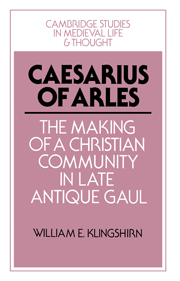Book contents
- Frontmatter
- Contents
- List of maps
- Acknowledgments
- List of abbreviations
- Concordance of Caesarius's Letters
- Map 1 The diocese of Aries and environs (c. 500)
- Map 2 The city and suburbs of Aries (c. 530)
- Introduction
- 1 In search of the vita perfecta
- 2 Late Roman Aries
- 3 The making of a reformer
- 4 Visigothic Arles and its bishop
- 5 The Ostrogothic peace
- 6 Christian rhetoric and ritual action
- 7 Christianity as a community religion
- 8 The limits of christianization
- 9 The coming of the Franks
- 10 The legacy of Caesarius
- Select bibliography
- Index
- Cambridge Studies in Medieval Life and Thought Fourth series
7 - Christianity as a community religion
Published online by Cambridge University Press: 02 December 2009
- Frontmatter
- Contents
- List of maps
- Acknowledgments
- List of abbreviations
- Concordance of Caesarius's Letters
- Map 1 The diocese of Aries and environs (c. 500)
- Map 2 The city and suburbs of Aries (c. 530)
- Introduction
- 1 In search of the vita perfecta
- 2 Late Roman Aries
- 3 The making of a reformer
- 4 Visigothic Arles and its bishop
- 5 The Ostrogothic peace
- 6 Christian rhetoric and ritual action
- 7 Christianity as a community religion
- 8 The limits of christianization
- 9 The coming of the Franks
- 10 The legacy of Caesarius
- Select bibliography
- Index
- Cambridge Studies in Medieval Life and Thought Fourth series
Summary
The “model for living” that Caesarius proposed to his audiences consisted of a system of interrelated beliefs, values, and practices elicited by specialists from the Christian scriptures over the course of several centuries. As we have seen, it was quintessentially an “organized” religious system which, unlike paganism, had not arisen from the community itself. Yet Christianity also aspired to function as a “community” and a “local” religion, conforming to the religious needs, traditions, and expectations of the local community, just as traditional paganism had always done. Since these were demands to which the Christian religion was in many respects deeply ill-suited, it comes as no surprise that commitment to the Christian value and belief system promoted by Caesarius was “differentially” distributed among the people of the civitas of Arles. At the periphery were those who refused allegiance to any form of Christianity, either openly or secretly, such as Jews and pagans, or those who refused allegiance to “orthodox” Christian theology, such as Arians. At the center were those who accepted, in principle at least, the whole of Caesarius's religious program, mainly clergymen, monks, nuns, and lay ascetics. Finally, between center and periphery were those who acted to accommodate the Christian religious system to their own family and community needs. In some cases this meant retaining traditional pre-Christian beliefs, practices, and values for which Christianity provided no suitable substitute. In other cases it meant adopting or adapting acceptable features of Caesarius's program. The diversity of religious practice that resulted was in fact the price to be paid for organizing a system of religion that saw itself called to encompass the entire community.
- Type
- Chapter
- Information
- Caesarius of ArlesThe Making of a Christian Community in Late Antique Gaul, pp. 171 - 200Publisher: Cambridge University PressPrint publication year: 1993



